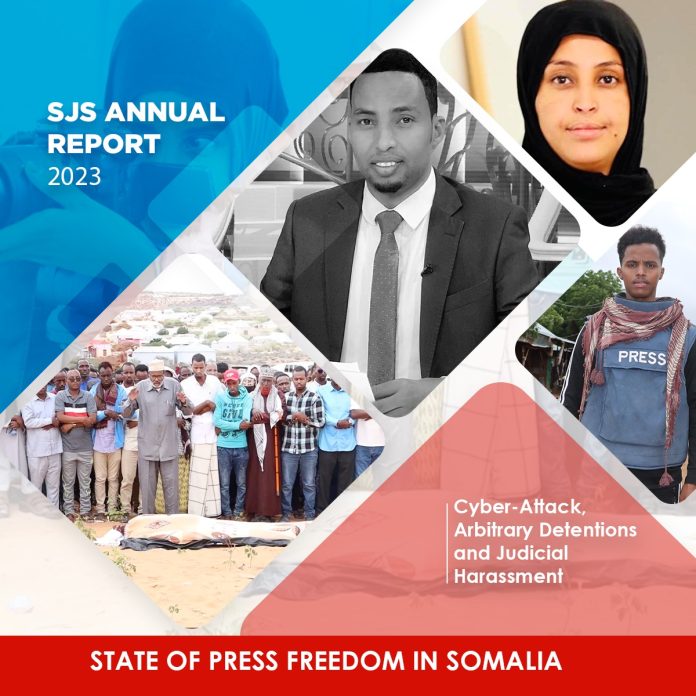
State of Press Freedom in Somalia 2023: Cyber-Attack, Arbitrary Detentions and Judicial Harassment

In the course of 2023, the Somali Journalists Syndicate (SJS) conducted extensive documentation efforts across the country, revealing numerous instances of threats, attacks, and persecution targeting media workers. One such incident involved an armed attack on Radio Barawe, the only minority community-owned independent radio station in the Southwest State of Somalia, resulting in the closure of the radio and its journalists fleeing into exile.
Additionally, SJS documented the arbitrary detention of 25 journalists, many of whom faced persecution and judicial harassment simply for carrying out their professional duties or advocating for media freedom. Notably, seven of these detentions, including one involving female journalist Busharo Ali Mohamed, were carried out by Somaliland authorities, while 18 cases were attributed to various Somali police units, the national intelligence agency, and affiliated regional forces such as those in Galmudug and Jubbaland. At least one media worker sustained injury in Mogadishu due to a knife attack.
Further exacerbating the challenges faced by journalists in Somalia, two television networks were instructed by local authorities to halt broadcasting or remove content deemed critical, while prominent journalists reported instances of forced removal of online content. This included reports exposing instances of torture perpetrated by Somali police in Mogadishu against a person with physical disabilities. Moreover, the Somali Ministry of Information boasted of its partnership with Facebook to censor online reporting critical of security forces combating Al-Shabaab, while Al-Shabaab itself threatened journalists collaborating with the state. Throughout the year, SJS documented numerous other cases involving online threats and physical violence against journalists.
Somali media organizations, including the Somali Journalists
Syndicate (SJS), encountered a substantial online assault, signaling a
concerning uptick in endeavors to sabotage their vital works. Employing a
distributed denial-of-service (DDoS) tactic, the cyberattack besieged the SJS website,
inundating it with traffic and rendering it inaccessible. Concurrently,
at least three other local media entities also found themselves under
siege by analogous attacks, underscoring the pervasive nature of the
threat faced by journalistic
platforms in the digital sphere.
Of particular concern is the increasing use of Facebook’s Community Standards and mass reporting to censor Somali journalists critical of the government, resulting in content take-downs, restrictions on freedom of expression, and the deletion of social media accounts. Journalists and media outlets critical of President Hassan Sheikh Mohamud’s government and the National Intelligence and Security Agency (NISA) faced widespread censorship on Facebook, with warnings of page restrictions, suspensions, or content removal often issued under the guise of combating "dangerous organizations and individuals” or "violating community standards.”
Throughout 2023, journalists in Somalia and Somaliland faced significant challenges in reporting on corruption allegations, human rights violations perpetrated by state security forces, and insecurity and deadly attacks carried out by Al-Shabaab. Despite constitutional commitments to uphold press freedom, impunity for crimes against journalists remains a pressing concern, with no progress made towards investigating and holding perpetrators accountable.
In light of these ongoing challenges, the Somali Attorney General must prioritize the safety and security of journalists and address the issue of impunity, especially through the Special Prosecution Unit established in 2020 to investigate crimes against journalists, including cases involving high-profile government officials. Furthermore, the persistent use of penal codes in both Somalia and Somaliland continues to pose a threat to freedom of expression, underscoring the urgent need for legal reform.
In response to these challenges, SJS and its international partners took significant actions in 2023, lodging two major complaints with the UN Working Group on Arbitrary Detentions (UNWGAD) and the Human Rights Committee. These complaints addressed the arbitrary arrest and detention of Mohamed Bulbul, Information and Human Rights Secretary of SJS, and the persecution of Abdalle Ahmed Mumin, the Secretary-General of SJS. SJS remains committed to pursuing justice and accountability for these violations of press freedom.
Leveraging its international affiliations, SJS continued its advocacy efforts by collaborating with various civil society organizations to champion causes such as media freedom, human rights protection, secure online access, and safety measures for human rights defenders, including journalists, not only in Africa but also across other regions globally.
In July 2023, SJS achieved a significant milestone by joining the prestigious International Press Institute (IPI), a global network comprising editors, media executives, and distinguished journalists. This membership further strengthens SJS’s commitment to defending press freedom, safety of journalists, and upholding freedom of expression, both within Somalia and on the international stage.
Throughout the year, SJS played a crucial role in supporting journalists amidst legal obstacles, providing a multifaceted approach to address the complexities of legal proceedings and threats to freedom of expression. This included offering legal defense support, mentorship, and advice to 47 journalists, with a significant representation of women. Additionally, SJS conducted training programs for 84 journalists, focusing on empowering female reporters and addressing human rights and women’s rights issues in Somalia. With support from organizations such as the National Endowment for Democracy (NED), Canadian Fund for Local Initiatives (CFLI), and Medico International, approximately 40% of the participants were women. SJS plans to continue similar training initiatives in 2024 to further enhance the capabilities of local journalists across vital areas of reporting.
Leave a comment
- Popular
- Rated
- Commented
04/11/2021 - 11:05:02
28/05/2024 - 15:44:10
02/12/2021 - 11:34:53
01/03/2021 - 09:00:37
Opinions
02/04/2025 - 18:34:53
27/02/2025 - 20:18:23
Politics
17/04/2025 - 01:58:17
13/04/2025 - 10:59:05
Terror Watch
26/04/2025 - 03:43:22
24/04/2025 - 13:30:44
24/04/2025 - 13:07:46
Press Releases
28/04/2025 - 18:24:22
 0
0 




































State of Press Freedom in Somalia 2023: Cyber-Attack, Arbitrary Detentions and Judicial Harassment
MOGADISHU, Somalia 10 March 2024 – The lack of transparency surrounding the assassination of Somali Cable TV director Abdifatah Moalim Nur (Qeys) by a suicide bomber in Mogadishu on October 16, 2023 and the unwillingness by Somali government�